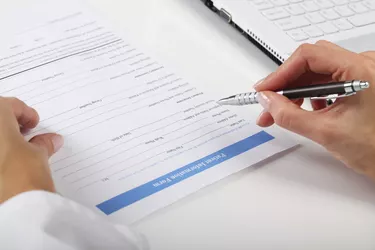
When you can't pay your medical bills, the first course of action is to negotiate a payment plan or settlement with the provider. If you ignore the bill, your account likely will be sent to a collection agency, which negatively affects your credit score. You may suffer wage garnishment, liens against your property and other consequences of a negative account on your credit report.
Negotiate with the Provider
Video of the Day
Most hospitals, clinics and private doctors will work with patients who can't pay their medical bills in full. Contact the billing office -- the phone number usually is right on the bill -- and explain your financial situation. The office will often set up a payment plan and may even be willing to forgive some of the charges.
Video of the Day
Ask if the organization has a patient advocate available. Patient advocates work with people to see if they qualify for federal, state or agency assistance. If the organization doesn't offer a patient advocate, hire your own. The Alliance of Professional Health Advocates offers a list of patient advocates in every state. These advocates charge for their services, but often are able to negotiate your balance and review your bill to ensure that all charges are accurate.
Some services, such as CoPatient, audit medical bills for a small fee. Depending on the amount and complexity of your bill, an audit may save you money. Your insurance company pays your medical bills based on a specific allowable rate for each procedure or test, identified and billed by a code. If your doctor or hospital billed under the wrong code, your insurance company may have paid less than it should have.
If your financial resources are limited, you can contact federal and state agencies directly. The federal programs Medicaid and CHIP are available to people with low incomes. While these programs are funded by the Federal government, they're operated by your state. Contact your state's department of health to speak to a representative who can assist you in applying for these resources.
If you know you won't be able to pay your medical bills in full, it's important to contact your provider within 90 days of treatment. The billing office will refer your account to a collection agency if you don't respond. Once that happens, the likelihood of direct negotiation with the provider is slim.
Collection Agencies Get Involved
If you ignore the bill for several months, the provider will send your account to collections. The collections department may be in-house, or a separate agency hired to collect on the debt. Once the account is in collections status, it begins to show on your credit report as a negative account. The consequences of a collections account on your credit report include:
- A lower credit score
- Difficulty obtaining some types of insurance
- The possibility of job offers being revoked
- Higher interest rates on everything from car loans to credit cards
- Denial of revolving credit accounts
- Inability to finance a house or car
When collection agents starts calling, communicate with them. While the account will still show on your credit report, the agency may be willing to set you up on a payment plan to satisfy the debt. If you fail to respond to collection attempts, the agency may sue you in court.
The Court Gets Involved
Ignore the collections agency, and you'll eventually receive a certified letter with a notice that you're named as the defendant in a lawsuit. The letter typically includes a hearing date. It's important to attend this hearing. The creditor or collection agency will present details about the debt. You'll also be given a chance to speak on your own behalf, or you may have an attorney represent you. This may be your last opportunity to make a payment arrangement, depending on the judge's willingness to facilitate one.
If the debt is valid, the judge will likely rule that you're required to pay it, and issue a judgment against you. The amount may include both the debt and costs of collection, such as attorney's fees. The judgment is also recorded on your credit report, further damaging your credit score.
If you fail to appear at the hearing, the judge will order a default judgment against you.
Garnishment and Liens
Once a judgment is in place, the provider or collection agency can ask the court for a writ to garnish your wages and put liens on your property. The writ is given to the sheriff, who notifies your employer of the court's order. Your employer notifies you in writing of the pending garnishment.
Federal law limits wage garnishment for medical bills. A creditor may garnish 25 percent of your disposable earnings, which is the amount you have left after paying federal, state and local taxes, Social Security and state unemployment deductions.
In some states, a judgment automatically creates a lien against your home or any other real estate you own. In other states, the creditor records the judgment with your county, which then applies the lien to your home. If you don't own real estate, the creditor may put a lien on personal property, such as an automobile. The lien must be satisfied before the sale of your house or car is completed.